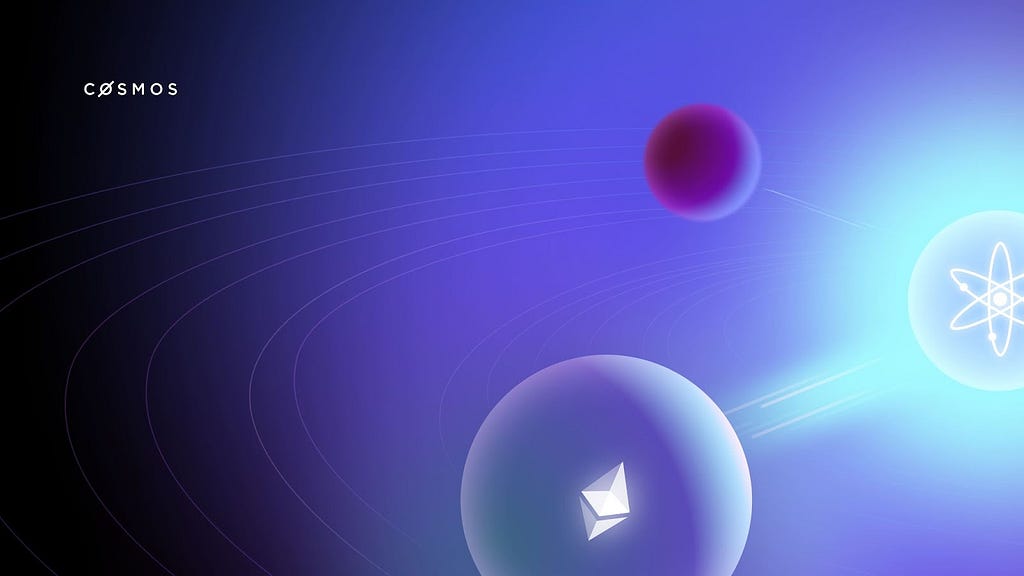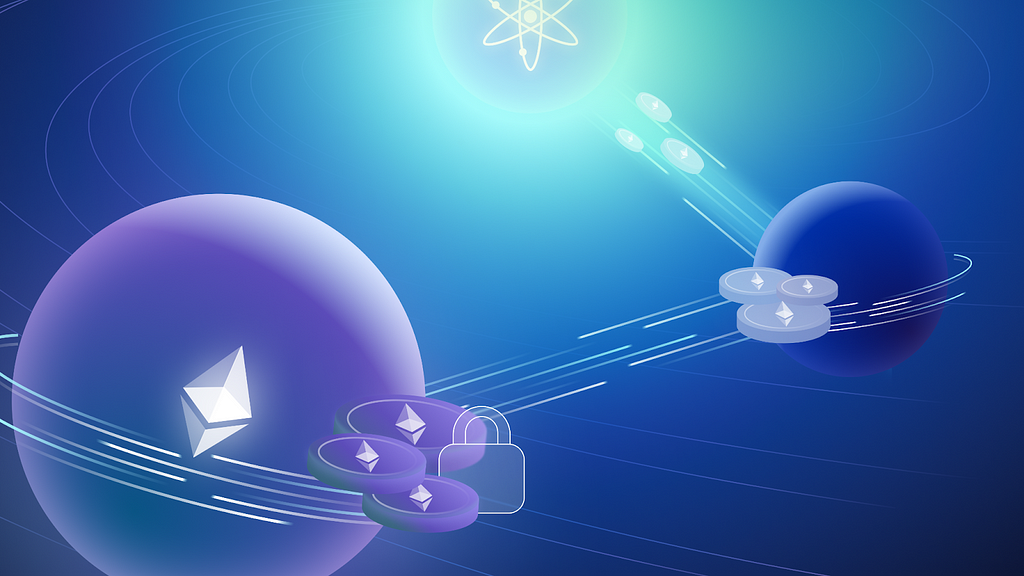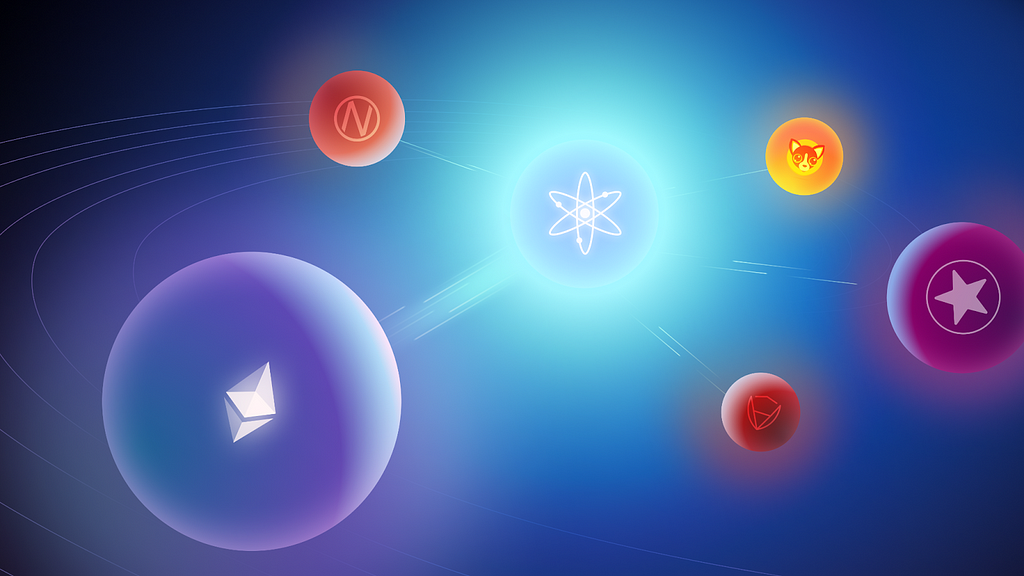Latest news about Bitcoin and all cryptocurrencies. Your daily crypto news habit.

Gravity is an essential force of the cosmos, aligning all planets in orbits in the composable universe. And like the force of gravity, Gravity Bridge is designed to funnel Ethereum ecosystem liquidity into the Cosmos ecosystem through a simple trustless and interoperable design.
Interoperability and trutlessness are the ethos of Cosmos and the Internet of Blockchains, and it’s these very core value propositions that will propel the ecosystem into the Era of Cosmos DeFi with the Gravity Bridge!
Gravity Bridge Milestones So Far
The Gravity Bridge recently announced several exciting milestones:
- Within weeks of enabling Inter-Blockchain Communication (IBC), the Cosmos standard for interoperability, Gravity Bridge entered the top 15 Cosmos chains on mapofzones.com with has 32 channels open to different Cosmos blockchains
- Cosmos NFT platform, Stargaze, is working with Gravity Bridge to send NFTs from Ethereum into Cosmos
- Initial Airdrops for the ATOM stakers and the OSMO community pool helped start distributing GRAV (the native token of Gravity Bridge) to the community
- Gravity Grants proposed to distribute, through governance, GRAV tokens to teams building bridge tooling and other infrastructure that benefits the Cosmos ecosystem
- Cosmos Hub and several other Cosmos chains (Stargaze, Nym, Comdex, CertiK, and Chihuahua) are bridged to the Ethereum ecosystem
- You can now use ATOM with Ethereum DeFi
What Is Gravity Bridge?
The Gravity Bridge blockchain is the trustless, neutral bridge between Ethereum and the Cosmos ecosystem. Built using the Cosmos SDK it uses the validator set to sign transactions, instead of a multi-sig or permissioned set of actors.
Neutrality here implies that the entire focus of the Gravity community is on providing the most effective and secure bridge possible, instead of on a DeFi application on the local chain. This neutrality aggregates volume from a number of blockchains and sources, increasing efficiency and lowering costs. All control over the bridge is handled entirely by the Gravity Bridge validator set.
Best Features:
The Gravity Bridge protocol is a radically simple bridge design, focused on providing better security by eliminating design complexity.
- Highly decentralized: All funds are directly controlled by validators (currently 140)
- Secure and censor-resistant: Advanced slashing ensures that validators cannot sign or submit bridge messages not agreed upon by consensus
- Built for Cosmos: Purpose built for the Cosmos ecosystem as a neutral platform with permisionless front ends
- Gas Efficient: Rollup-style batch transactions reduce individual users’ gas costs by up to 96%
- Fast and Reliable: Robust relaying reward systems combined with reduced gas costs create extremely fast and reliable transfers with a decentralized, self-funded, relayer community
How Gravity Bridge Works
Unlike IBC that works with Cosmos chains with finality, the Gravity Bridge transfers assets between probabilistic EVM blockchains, like Ethereum and ERC-20s, Polygon, etc. The Gravity Bridge has two defined components:
1) A Solidity contract on Ethereum
2) A Cosmos SDK module on the Gravity Bridge blockchain
The way Gravity Bridge works is similar to how all cross-chain bridges work: which is to lock up a native token on one side of the bridge and mint a representation of that token on the other. This representation is then used by the user before it is returned to the bridge and redeemed for the native asset on the other chain.
For bridges to and from Ethereum, the most critical component is the Solidity contract. It holds the native assets being sent across the bridge.
Gravity.sol, the Solidity contract developed by the Althea team, holds funds for Gravity Bridge on Ethereum. In contrast to the prevailing trend in other bridge designs, at a mere 580 lines of code, Gravity.sol is compact and easy to review. It has been audited by three independent teams (Informal, Least Authority, and Code4rena) and it is not upgradable, meaning that auditors found it cannot be tampered with by any malicious actor and does not contain any trusted parties, of any kind.
Deposits:
Depositing assets to Gravity Bridge from Ethereum is permissionless and censorship-resistant. Each validator attests to every deposit event as they occur on Ethereum. When an event is attested by more than ⅔ of the validator set, representative tokens are minted. Validators must submit all attestations in order.
Withdrawals:
Gravity Bridge batches withdrawal transactions, placing multiple SendToEth messages together in an individual batch. This works like a rollup on Ethereum: Executing many transactions in a single shared context is far more efficient than doing so individually.
This process provides huge efficiency gains with up to 96% reduction in gas cost.
For example, if an ERC20 transaction costs $20 to send, moving tokens from Gravity Bridge to Ethereum in a batched transaction will cost only $4, which is distributed across all individual transactions in the batch, with users paying less than $1.
The second advantage to batching is censorship-resistance since the Gravity Bridge protocol itself defines what transactions go into each batch and then requires that validators produce valid signatures. It is not possible for a validator to avoid signing a specific transaction or for a relayer to avoid relaying it.
Slashing and Security:
To ensure that Gravity Bridge blockchain consensus remains in control of the bridge and the assets it holds, the Gravity Bridge protocol institutes several rules:
- The protocol generates what messages should be signed next by the validators
- When signatures are submitted, they are validated as part of consensus and rejected if the validators do not sign the correct message
- If a validator does not produce the correct signature within the slashing period, they are slashed and kicked out of the Gravity Bridge validator set (also removing them from the Ethereum side of the bridge)
- Anyone can submit evidence of a signature over a non-protocol message to slash a validator
Evidence-based slashing for Gravity Bridge signatures makes it extremely difficult for validators to collude to steal funds from the bridge. In doing so, they risk any single defector getting them slashed while they endeavor to collect the required signatures.
How to Use Gravity Bridge
Gravity Bridge has permissionless front ends, and several teams have built user interfaces for sending assets to Cosmos or sending Cosmos assets to Ethereum. You can currently use the bridge to send between Cosmos and EVM ecosystems with:
If you want to get started with Gravity, you can find easy-to-use instructions here:
Tutorial: Sending Gravity Bridge tokens (Gravitons) to Osmosis via IBC
Tutorial Docs: Bridging Tokens and using Gravity Bridge
Proposals to support as many assets as possible are ongoing, and already the Cosmos Gravity Bridge has some awesome project integrations, including:
- ATOM
- HUAHUA
- NYM
- PERSISTENCE
- STARS
- COMDEX
The Team Behind Gravity Bridge
Contrary to popular belief, Gravity Bridge did not receive funding from a Cosmos Hub proposal, but was built and primarily funded by the Althea team together with support from Interchain Foundation, Peggy JV and others, but has a long history as part of the Cosmos community that is reflected in the distribution of 9% of the Genesis tokens to core Cosmos entities:
Core ecosystem Total 9.000%
Interchain Foundation & Cosmos Hub Community Pool 154,000,000 7.000%
Peggy JV. 22,000,000 1.000%
Ignite (formerly Tendermint) 22,000,000 1.000%
GRAV Token Allocation
The initial Genesis accounts for the multiple funding and development sources (development support and team) for the bridge included, in order of value, Althea contributions, Peggy JV and crowd sourced funding, and grants from the Interchain Foundation (ICF). Genesis also supports a robust development team and ecosystem alignment. The early Althea supporters and team allocations represent close to 50 different entities and individuals who shared the blood, sweat, and tears of the many years building the talent and code necessary to bring the bridge to life and who will be supporting the bridge in its future.
Gravity Bridge also exists as an open source module which has already, and continues to, benefit many other Cosmos chains in the ecosystem.
GRAV was minted and granted by the Gravity Foundation without any prior sales of GRAV tokens or contributions from the ATOM community pool. 7% of tokens were allocated to the Interchain Foundation for funding and coordinating part of the development of the Gravity Bridge technology. The ICF is dedicating 110,000,000 grav tokens (5% of the total genesis) to the Cosmos Hub Community Pool.
Until Interchain Accounts launches and they are sent to the Cosmos Hub Community Pool, the ICF will be delegating the tokens to validators of the Cosmos Hub who operate on the Gravity chain. This will help ensure an ATOM aligned Gravity chain continues to invite further participation of Cosmos Hub validators on the road to Gravity Bridge adopting Interchain Security. If you’re an ATOM holder who wants Gravity Bridge Chain to adopt Interchain Security, consider delegating to a Cosmos Hub validator too! To learn more about this plan check out the latest Interchain Security Update.
All Genesis tokens, other than the Genesis validators, are in a 4-year locked schedule: one year lock up and incremental release over the remaining 3 years.
Gravity Sustainability and Cosmos Growth
Gravity, unlike dApp or DEX chains, is infrastructure. Like aqueducts or sewers or roads or bridges, they must last for years, reliably providing a service that “just works.” So, when considering distribution, stakeholders should be aligned with that use, over time, not just a “once and done” airdrop. Gravity Bridge began with an initial seed airdrop and proposes to distribute GRAV over time to users and teams building and maintaining the bridge.
To this end, a further 50% of the Genesis tokens was allocated to the Genesis Community pool for distribution over the next several years to incentivize growth and support the maintenance and health of this critical piece of infrastructure.
Once the Community Pool has been distributed, the stakeholders of the bridge will be a decentralized pool of developers and bridge maintainers, ATOM and other Cosmos ecosystem holders, Cosmos core entities, and users of the bridge.
The first iteration of distribution to building teams, will be the Gravity Grants program that will support building Gravity Bridge and Cosmos Ecosystem Goods. Kicking off this grants program will be a grant to build and maintain user interfaces and another supporting documentation and support for IBC relayer infrastructure.
What’s next?
- Initial seed airdrop: completed
- Beta NFT support completed
- Initial Gravity Grants proposals: Early March 2022
- Formation of Gravity Growth: Early March 2022
- Mercury Update March 2022
- Liquidity Mining Rewards on other DEXs (TBA)
- Additional EVM chain integration (TBA)
Stablecoins and liquidity flowing into the Cosmos ecosystem will pour fuel on the fire of Cosmos DeFi. Opening up interoperability and new sources of liquidity, will bring in new participation into the Cosmos ecosystem where decentralized applications and DeFi can flourish. The Era of Cosmos DeFi is upon us!
You can find out more information and updates here:
Blog Twitter Discord Youtube Governance Forum
*COSMOS is the registered trademark of the Interchain Foundation, and is being used by permission. GRAVITY BRIDGE is the trademark of Gravity Bridge.
**This is a guest post from Althea and the opinions expressed here are of the author.
Everything You Need to Know About the Gravity Bridge Chain was originally published in Cosmos Blog on Medium, where people are continuing the conversation by highlighting and responding to this story.
Disclaimer
The views and opinions expressed in this article are solely those of the authors and do not reflect the views of Bitcoin Insider. Every investment and trading move involves risk - this is especially true for cryptocurrencies given their volatility. We strongly advise our readers to conduct their own research when making a decision.

